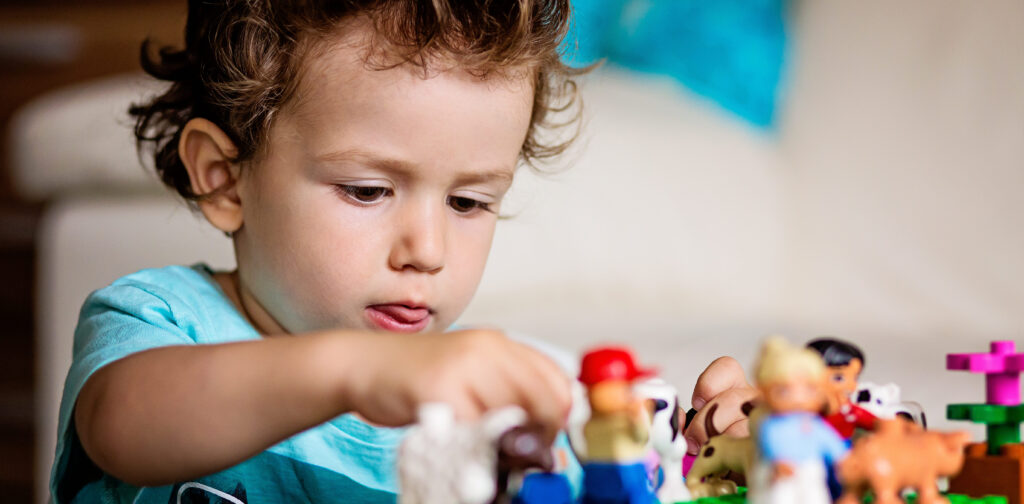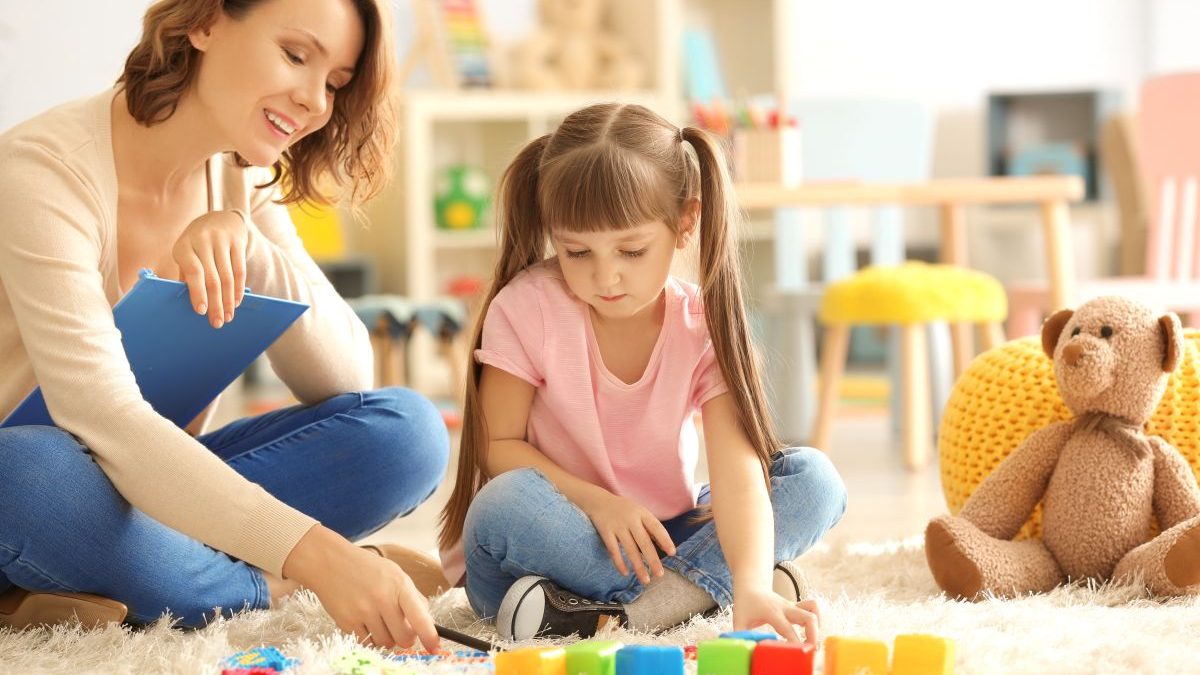
by Staff writer
The challenges of play therapy during a pandemic
In previous articles we’ve talked about the difficulties of the pandemic broadly, and in the specifics of how it changed how our therapists have had to work when supporting clients and delivering specific clinical models such as EMDR. After discussing the matter with our play therapy team, today we’re going to be addressing the challenges of delivering play therapy during a pandemic, specifically when working with children and young people, how challenging they have been to overcome, and reasons for why that may be the case.
At the time of writing, it is also Mental Health Awareness Week in the UK, and the topic of the moment is the mental health of children and young people suffering greater adversity during Covid 19. Consider these statistics provided by Children in Need, which we have been addressing on our social media platforms. As such, we will also take the time in this article to explore what parents, carers and educators of children suffering under lockdown can potentially do to best provide support of their own during this time.
What is Play Therapy?
Play therapy is the primary clinical model that we utilise when providing therapy for children. This is beause it’s much easier for children to engage with than talking therapy such as CBT, which we might provide for an adult. As opposed to other models of therapy, which typically require the client to verbalise their issues, play therapy is a non-talking therapy. Sessions engage the client by providing them with other ways to express their feelings and concerns when it is difficult to do so with words, either because the client is too young to articulate themself, or uncomfortable doing so.
What are the Challenges of Delivering This Therapy During a Pandemic?
When lockdown began in March of 2020, we transitioned the majority of our clinical work to a remote setting using video chat services. However, play therapy inherently involves the child and therapist engaging in play and arts and crafts activities together in an appropriate physical space, and so we had to put it completely on hold. The dilemma was clear. How were we to expect a 5-year-old to reliably sit still in front of a camera for an hour, let alone transition from non-directive play with a sand tray and paints to discussing their feelings verbally over a zoom call?
As a result of this, our play therapists were sadly required to suspend the courses of therapy that they were conducting with the children in their care part way through their courses. This was an upsetting disruption for many of the children, particularly those who were drawing a sense of comfort and familiarity from the consistency of the course. Crucially, the therapy that we provide to them takes the form of a quite purposefully set out schedule of intervention. These are difficult to resume after a hiatus of delivery without losing significant pre-established progress. In practice, many of those sessions never continued at all after the disruption occurred.
The therapists we spoke to have remarked that it was difficult on a personal, emotional level not being able to have any contact with the children in their care after suddenly being required to terminate the connections they were building. Not being able to know how they were doing, if they were managing to cope in absence of their therapeutic support. Unexpected breaks in communication without a proper ending are a regrettable but ultimately unavoidable occurrence that every therapist must accept will happen every once in a while, but to have all the children’s sessions immediately terminated with most never to be resumed was particularly upsetting, especially given the turmoil of the circumstances that the therapists knew these children would be returning to entirely without their clinical support.
This persisted until July, when lockdown measures began to ease again. Even now though, necessary safety restrictions on the delivery of play therapy while Covid19 persists make for a clinical experience that remains markedly different from the one we were previously able to provide. Hygiene mandates mean that we’re unable to work with soft toys, dress-up costumes or sand trays at the moment, and the therapists need to be much more strict about keeping sessions to a 45-minute duration to allow time to sanitise the play rooms afterwards.
There have been changes that have complicated the specific task of providing clinical support to children as well. It became clear early on that wearing a lower face mask made finding a state of grounded comfort and ease in the play room much more challenging for some children, inhibiting the positive impact that they were able to achieve from the sessions. It was similarly evident that certain children had particular difficulty engaging with their therapists in the same way as they had before. For others, we found that they missed the emotional affect and warmth that they had previously expected to be able to receive from the sessions. This was much more pronounced with the increased physical boundaries that social distancing necessitated.

Our therapists have picked up on significant reoccurring themes across their client base of children and young people since the pandemic started. By design, lots of play therapy involves imaginative and creative play, including creative activities such as roleplay and storytelling. This is facilitated in a non-directive manner in which the children are the ones who chose which options they want to engage with from a range of prompts.
In practice, we noticed a significant increase in the amount of roleplay than children normally went for before, as opposed to painting, sensory stimulation play, music & dance, etc. This was especially true of younger children in the early years bracket. We speculate that this may be the case because current circumstances have deprived them of the opportunity to act out their theories on life the way they used to.
It is well established in academic study of child psychology that roleplay and imaginative play serves this function for enrichment. For children within that developmental window more so than any other, it is a critically important tool for enabling their cognitive and social development.
If roleplay and solitary reverie are the ways in which we conceptualise our understanding of the world, and then test them out, then where children in their early years are unable to experiment with their peers and carers to realise their conceptual understanding of the world around them, they will naturally find themselves condensing it with greater internal speculation.
As such, these children are predisposed to seek the chance to compare their daydreams and fantasies with the reality of complex problem solving and human interaction. Despite this, now more than ever they are finding themselves critically under-enriched and there is significant value for children in education provisions to access play therapy as an exercise in being able to achieve this enrichment with the guided support of a skilled professional.

Concerning the content of the roleplay and creative conceptualisation that our therapists observed during the period since lockdown began, certain recurring themes emerged more than others. A focal point of this observation was exercises in which children are asked to arrange toys and items to create a world of their choosing. Usually, children heavily lean on concepts from their own life, family, school etc. They will typically represent them in abstracted ways, encouraged by the therapist, to explore how to approach the things that intimidate them and better understand the things that confuse them.
Presently, we’ve determined that children engaging in this work will far less frequently envision things that interest or excite them. Conversely, most only want to focus on envisioning a world where Covid doesn’t exist, or never happened. In other terms, they are primarily preoccupied with desire for that sense of escape from their overwhelming worry, before they can even consider what else might actually appeal to them outside of it.
Additionally, we have learned that while children who experienced in-school socialisation with their peers prior to lockdown beginning have taken to online learning and socialisation, they clearly aren’t receiving the same degree of emotional support and catharsis from them as they used to in person. Similarly, the behavioural difference in older children and adolescents accessing therapy online is very stark. Our therapists describe that compared to the time before lockdown began, they have become much lower in mood and affect.
Its clear that all of them are struggling for being bereft of the things they relied on before. A topic that concerns us increasingly at the moment is the degree to which children don’t have nearly as much to look forward to. Not only has their ability to interact with the world been severely inhibited, but also their creativity and ability to supplement that through play with each other. It’s only natural that their sense of enthusiasm, optimism and joie de vivre are also going to suffer in turn.

Lastly, it’s unclear how widespread the impact of the pandemic will prove to be on these children’s cognitive development. In discussions with other professionals around therapy and care planning for the children in our care, learning outcomes have provided one of the biggest topics of discussion. It’s fair to say that across the board we are all feeling great concern for their cognitive and emotional development.
One of the most frequent questions that our play therapists have been asked by parents, carers, teachers and social workers who we are involved with is “how can we help?” The answer to this from our play therapists has been a unanimous call to set aside uninterrupted quality time to play with them. Again, the whole reason that this forms a cornerstone of therapeutic interaction with children is that whether they are aware of it or not, they will find it much easier to express how they are feeling, and what they need in this way.
Consider the most challenging issues that we are called to provide support for when children are clearly in distress. Are they presenting with behaviours that are impossible to reliably control and de-escalate? Ask yourself what other opportunities they possess to act upon their confusion and frustration. It’s difficult enough for us as adults to regulate our emotions despite this disruption in our lives, but we may take it for granted just how disorienting and overwhelming it must be without having experienced growing up without ever having to worry about them. Whether the children who are dependent upon you for a sense of routine are able to do their schoolwork or not, this can be an incredible method of keeping a routine.
Achieving this can, of course, be difficult in and of itself considering the restrictions we must still face upon time and travel, to say nothing of your own ability to lead this sort of play as an adult when you yourself are also struggling with all the stress of lockdown. This is why we continue to be emphatic in our availability to provide these services professionally, whether as part of a more deliberate and directive course of therapeutic intervention, or in support of EBD & SEND needs.
If you would like to learn more about our services and the clinicians who work for us on an associate basis, or if you have a question you would like us to answer, please contact us at the office on 01282 685345 or at office@jsapsychotherapy.com


